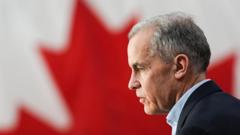In a pivotal election that redefined Canada's political landscape, Mark Carney has ascended to the role of Prime Minister, unexpectedly reversing the Liberal Party's fortunes. His rise comes at a time of heightened trade tensions with the United States, driven largely by former President Donald Trump's controversial tariffs. Carney has positioned himself as a leader prepared to confront these challenges not only with economic strategies but also through robust diplomacy.
Carney’s central message throughout the campaign has been a commitment to defending Canada’s economic sovereignty against perceived aggressions from the US. In one of his final campaign appearances in front of the US-Canada border, he emphasized the gravity of Trump's actions, stating, “President Trump has ruptured the global economy… America's leadership is over.” This narrative appeared to resonate with voters, particularly in provinces most affected by US tariffs, including Alberta and Quebec—regions crucial for both the economy and national unity.
Polls had initially shown a bleak future for the Liberals, trailing behind the Conservatives amid voter dissatisfaction. However, the changing tide came after Trump's tariffs on Canadian goods were instituted as a national security measure. These aggressive stances prompted Canadians to rally around the Liberal cause, ultimately leading to victory for Carney, who champions a promise of “Team Canada.” This new government aims to navigate and renegotiate trade policies that have left many sectors struggling.
In his recent interview with the BBC as results came in, Carney underscored the significance of fostering a “win-win” partnership with the US, stressing Canada’s pivotal role as a chief supplier of essential resources to American states. He is keen on portraying Canada as not just a neighbor but a critical economic ally capable of supplying key minerals, energy, and agricultural products—strengthening trade ties while asserting independence from the whims of US policy.
Additionally, Carney’s government anticipates leveraging the challenges faced by the US economy—including growing inflation and trade deficits—to negotiate more favorable terms for Canadian businesses. Notably, international attitudes are shifting, with countries like Japan expressing dismay over the current US trade approach; the implications of this may yield new opportunities for Canadian diplomacy.
Looking ahead, Carney’s first significant international event will be the G7 Summit scheduled in Alberta, which may be a pivotal moment for reconciling various trade interests amid the current climate. Through his tenure, Carney is faced with the complex task of balancing domestic pressures and external relationships in a landscape that is increasingly uncertain.
His ability to adapt to these intricacies—and navigate past political alliances and the persistent threat from the south—will be paramount for his administration's economic legacy. As divisions deepen, Carney can potentially unify political sentiments within Canada, making a case for cooperative but assertive international engagement, thus transforming both Canadian trade policies and relationships on a global scale.
Carney’s central message throughout the campaign has been a commitment to defending Canada’s economic sovereignty against perceived aggressions from the US. In one of his final campaign appearances in front of the US-Canada border, he emphasized the gravity of Trump's actions, stating, “President Trump has ruptured the global economy… America's leadership is over.” This narrative appeared to resonate with voters, particularly in provinces most affected by US tariffs, including Alberta and Quebec—regions crucial for both the economy and national unity.
Polls had initially shown a bleak future for the Liberals, trailing behind the Conservatives amid voter dissatisfaction. However, the changing tide came after Trump's tariffs on Canadian goods were instituted as a national security measure. These aggressive stances prompted Canadians to rally around the Liberal cause, ultimately leading to victory for Carney, who champions a promise of “Team Canada.” This new government aims to navigate and renegotiate trade policies that have left many sectors struggling.
In his recent interview with the BBC as results came in, Carney underscored the significance of fostering a “win-win” partnership with the US, stressing Canada’s pivotal role as a chief supplier of essential resources to American states. He is keen on portraying Canada as not just a neighbor but a critical economic ally capable of supplying key minerals, energy, and agricultural products—strengthening trade ties while asserting independence from the whims of US policy.
Additionally, Carney’s government anticipates leveraging the challenges faced by the US economy—including growing inflation and trade deficits—to negotiate more favorable terms for Canadian businesses. Notably, international attitudes are shifting, with countries like Japan expressing dismay over the current US trade approach; the implications of this may yield new opportunities for Canadian diplomacy.
Looking ahead, Carney’s first significant international event will be the G7 Summit scheduled in Alberta, which may be a pivotal moment for reconciling various trade interests amid the current climate. Through his tenure, Carney is faced with the complex task of balancing domestic pressures and external relationships in a landscape that is increasingly uncertain.
His ability to adapt to these intricacies—and navigate past political alliances and the persistent threat from the south—will be paramount for his administration's economic legacy. As divisions deepen, Carney can potentially unify political sentiments within Canada, making a case for cooperative but assertive international engagement, thus transforming both Canadian trade policies and relationships on a global scale.





















